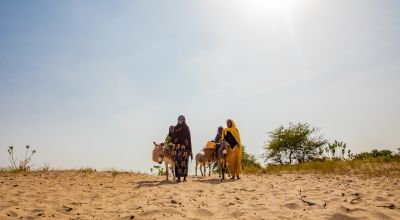
Read our 2023 annual report

Knowledge Hub
As world leaders congregate at COP29, the world’s most important climate summit, displaced villagers in Malawi brace for another stark reminder of their growing vulnerability to climate change.
The situation facing the Nyachikadza Traditional Authority (TA) and community in Bitilinyu camp, Ndamera, exemplifies what Malawi’s Minister of Health referred to as a population “paying for the climate crisis with their lives”. These villagers embody the reality of climate migration, and are a powerful reminder that when the world delays climate action, the most vulnerable pay the highest price.
Nyachikadza is located between the Shire River to the east and the Ndindi Marsh to the west, in the southern region of Malawi, and is extremely prone to flooding. When the Shire River overflows, it channels water into the Ndindi Marsh, severely affecting the community. Due to its isolated, almost island-like location, rescuing residents during floods requires canoe or motorboat. Unfortunately, by the time rescue arrives, significant loss of both lives and assets has occurred.
From temporary evacuations to permanent displacement
For the communities in Nyachikadza, displacement used to be an “on and off” phenomenon, with temporary evacuations for high-risk groups such as elderly, disabled and women. However, an increase in intense flooding and rain events in recent years has led to Nyachikadza almost entirely submerging under water, and temporary evacuations to Bitilinyu camp are becoming permanent.
Currently, all houses in Nyachikandza are destroyed. Each flood and relocation comes with an increased loss of assets, savings, and income. Previously, those displaced could access Nyachikandza in the dry season or engage in winter farming for some additional income. Yet, this is no longer the case, as the land has remained flooded even in the dry season, putting more deprived livelihoods further at risk.

Lost livelihoods and limited options
Still recovering from the devastating Cyclone Freddy in 2022, which affected 500,000 people, killed over 1,200 and destroyed 50,000 homes, the villagers recall the last-minute evacuation notice they received, which preceded two weeks’ worth of flooding compressed into just five hours.
At that time, survival was priority, and most evacuated via small canoes, only taking a few essentials with them. The rest, they say, were lost in the floods. While villagers may visit Nyachikadza to find and retrieve old items or for farming opportunities, it is highly unlikely that they will return to their homes.
Weather events like Cyclone Freddy have left a lasting impact, leaving individuals without land to cultivate, means to travel to nearby villages for work, or the ability to rely on livestock for their livelihoods – the resources they depend on for survival.
An uncertain life at Bitilinyu camp
Although the relocation to Bitilinyu offers several benefits like school facilities, access to electricity, health services and boreholes, it is still not home.
Members of the Nyachikadza community remain uncertain about rebuilding their lives here, as increased clashes with the local TA and landowners have left them unsure about whether they can stay long-term.
Currently, the community has temporary housing and no access to farmland or loans. Without a source of income or sufficient funds, their lives will not go back to normal. Members noted the irony of how quickly they went from those who produced and sold maize and rice, to spending a significant amount of the little income they make to purchase it.
The Nyachikadza community is living hand to mouth, with their income coming from piecework or casual labour and having no ability to save money, harvest, or make plans for their family.
The Chair of the community’s Development Committee shared that the group fears for their future. With a daily income between 1 000 and 2 000 Malawi Kwacha (USD equivalent: $0.58 – 1.16), “we are not only living below the poverty line, but we are also at risk of food insecurity, particularly in the coming rain season”.
Malnutrition and flooding are closely linked and affect everyone in Bitilinyu camp. With scarce rainfall and the river overflowing, communities are unable to farm or fish for food. As a result, households currently manage only one meal per day, mainly consisting of maize meal and lacking essential food groups. This malnutrition brings additional health risks, including preventable diseases like malaria, which remains widespread across Malawi.

With each rain, the communities feel increasingly more hopeless and morale across community members is at an all-time low. With the rainy season approaching, casual labour activities like harvesting are becoming increasingly rare, and there are limited opportunities for seeking labour and employment around the camp.
Looking at her infant baby, Eliza said that she knows their future will be harder than her childhood. She noted that her family barely makes ends meet, so supporting her children at school and providing them with nutritious meals - issues that her parents never faced - are ones that she experiences daily.
While climate crises affect the poorest the most, they often receive the least support. “Everyone is hungry now,” Eliza says. “Not just those under Malawi’s social cash transfer programmes.” Though the residents have set up a small tree nursery, the outputs of it will not be able to support all the families in Bitilinyu.
We will soon be a district with no people
Climate migration threatens the very survival of this and many other vulnerable communities across Malawi. When asked about the situation, Sige, an elderly resident of the camp, voiced her concern, saying that if it persists, "we will soon be a district with no people."
Situations like that of the Nyachikadza community are one of the main reasons that a new climate finance goal be decided on - and adhered to - at COP29, to ensure that vulnerable countries are supported in building resilience against the impacts of climate change.

Concern's work in building resilience
Malawi is one of the countries facing the brunt of climate change and extreme climate events. The country, which is already vulnerable due to its 70% poverty rate and high levels of malnutrition, is inadequately prepared for disaster preparation and response.
Concern Worldwide has collaborated with the Nyachikadza community through the Zurich Climate Alliance Programme. We have supported their disaster risk management committee with protective gear for search and rescue operations during flooding events, trained members in first aid, hosted simulation and drill exercises, and provided tools like megaphones for early warning system support.
To address food and income insecurity, Concern provided the community with banana suckers and supported them with farm inputs for irrigation farming via seed fairs and the creation of village savings and loans groups.





